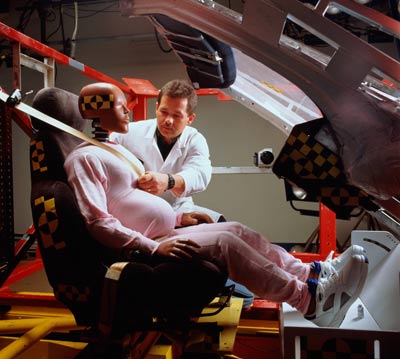House Energy And Commerce Committee Approves New NHTSA Fine Cap, "Vehicle Safety User Fee," More
The House Energy And Commerce Committee has passed an amended version of the Motor Vehicle Safety Act that was previously approved by its Subcommittee on Commerce, Trade and Consumer Protection. True to our prediction, longtime auto industry ally Rep John Dingell (D-MI) was able to maintain caps on NHTSA’s fining power at $200m per automaker per defect recall (up from the current cap of $16.4m) and $5m per auto executive per defect, and require that NHTSA inform automakers and allow for an appeal before invoking the “imminent hazard” powers authorized by the bill. Dingell tells Automotive News [sub] that
The bill is going to be a hard one for the industry to accept, but I believe it’s in the public interest and is good overall.
The Committee-approved version of the bill still doubles NHTSA funding to $280m over three years, and establishes a $3 per new-vehicle-sale “vehicle safety user fee” that will increase to $9 per new-vehicle-sale in the same three-year timeframe. The bill also prevents former NHTSA employees from lobbying the regulator for a year after leaving their government positions. It also makes brake-override systems and “black box” event data recorders mandatory on all new cars sold (although it doesn’t require that EDRs record for 75 seconds, as previous drafts did), but allows NHTSA to set a timeline for implementation of these standards. If passed into law, the bill would also require NHTSA to come up with standards for
foot-pedal placement, electronic systems, push-button ignition systems and transmission configuration
Several previously undisclosed measures were also approved by the Energy and Commerce Committee. $40m was approved to study the feasibility of in-car systems that would prevent drunk drivers from starting a vehicle, and a provision that requires NHTSA to establishperformance requirements for an alert sound that allows blind and other pedestrians to reasonably detect a nearby electric or hybrid vehicle operating [in EV mode]According to the Detroit News, an amendment was also introduced by Rep Mike Rogers (D-MI) that would havebarred NHTSA from collecting civil fines from General Motors Co. and Chrysler Group LLC while the companies are under government ownershipThat amendment was reportedly defeated by a vote of 17 to 23, but as this goes live there is no record of such an amendment in the Committee’s markup record.The Senate version of the bill now varies considerably from HR 5381 which must still be approved by the full House of Representatives, but the Senate Commerce Committee has yet to schedule a vote on its version. Once that happens, a compromise will have to be reached in conference committee before the President can sign the legislation into law.Having mitigated what it saw as the most distasteful elements of the bill, namely provisions granting NHTSA “imminent hazard” authority and uncapping of NHTSA fines, the industry appears to have made its peace with the compromise embodied in HR 3581, although industry groups like the Alliance of Automotive Manufacturers have yet to release official statements. Republicans remain in vocal opposition to the bill, having failed to prevent its passage in a party-line vote, and are reportedly preparing a number of further amendments.More by Edward Niedermeyer
Latest Car Reviews
Read moreLatest Product Reviews
Read moreRecent Comments
- TheEndlessEnigma Not only do I not care about the move, I do not care about GM....gm...or whatever it calls itself.
- Redapple2 As stated above, gm now is not the GM of old. They say it themselves without realizing it. New logo: GM > gm. As much as I dislike my benefactor (gm spent ~ $200,000 on my BS and MS) I try to be fair, a smart business makes timely decisions based on the reality of the current (and future estimates) situation. The move is a good one.
- Dave M. After an 19-month wait, I finally got my Lariat hybrid in January. It's everything I expected and more for my $35k. The interior is more than adequate for my needs, and I greatly enjoy all the safety features present, which I didn't have on my "old" car (2013 Outback). It's solidly built, and I'm averaging 45-50 mpgs on my 30 mile daily commute (35-75 mph); I took my first road trip last weekend and averaged 35 mpgs at 75-80 mph. Wishes? Memory seats, ventilated seats, and Homelink. Overall I'm very pleased and impressed. It's my first American branded car in my 45 years of buying new cars. Usually I'm a J-VIN kind of guy....
- Shipwright off topic.I wonder if the truck in the picture has a skid plate to protect the battery because, judging by the scuff mark in the rock immediately behind the truck, it may dented.
- EBFlex This doesn’t bode well for the real Mustang. When you start slapping meaningless sticker packages it usually means it’s not going to be around long.


































Comments
Join the conversation
Was it a coincidence that NHTSA found previously unaccounted corpses in their complaint database, right before the committee vote?
Do we really need this? "If passed into law, the bill would also require NHTSA to come up with standards for foot-pedal placement, electronic systems, push-button ignition systems and transmission configuration" Or, this? "performance requirements for an alert sound that allows blind and other pedestrians to reasonably detect a nearby electric or hybrid vehicle operating [in EV mode]"